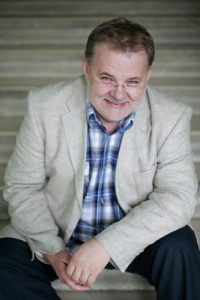Until WWII, Poland was ethnically and religiously diverse – a natural environment for lots of differing opinions. These were explored and hotly debated in various newspapers and books, a burgeoning cabaret scene and flourishing theatres – all amid an era of sexual and social liberation. Writers like Tadeusz Boy-Żeleński spoke out in favor of women’s rights and advocated for a forward-looking Poland.
The war ended all that – and so much more. And the ensuing decades of communism meant a dreary, grey physical world, and a rigid set of ideas and ideals.
Most recently, Poland’s “gender wars” indicate that there may once again be a strong movement seeking to control society.
Sometime last year, the Polish Church began using the word “gender” as a catchphrase for all it deemed a no-no and announced that a “gender ideology” was now threatening the very bedrock of civilization – just like Stalinism, Nazism and Marxism had in the 20th century.
Polish media pounced. The debate reached Western media in early 2014: The New York Times (January 2014: “The Polish Church’s Gender Problem” and The Guardian (February 2014: “Poland is having a sexual revolution in reverse”). To read what the Church itself has to say on the topic, here’s a letter about “gender ideology” from the Polish Bishops’ Conference that was read aloud in Polish churches on Dec. 29, 2013.
Thus, when I came across an enormous, 700+ page volume titled, Seksualność Polaków (The Sexuality of Poles), I was intrigued. All the more so when I learned that its author, Prof. Zbigniew Izdebski, has been studying Poles’ sexuality for decades, long before “gender ideology” became an issue – since the late 1980s.
His concentration is human sexuality at different stages of life; he’s studied the sexual life of everyone from teens to folks 50+. His research has spanned Polish female sex workers, lesbians and homosexuals, individuals with HIV and/or AIDS, and the sexual lives of the disabled. His work – and writings – are based on the methodology of social research, which examines a given society’s beliefs, rules, and attitudes, and determines relationships between variables, such as gender and income.
He’s a sexual educator, and though not a medical doctor, he does see patients as a clinical sexologist.
We spoke via Skype; he was at his office at the University of Warsaw, where he’s part of the Department of Biomedical Aspects of Development and Education. In 2010, he was appointed a five-year scientific affiliate of the famous Kinsey Institute for Research in Sex, Gender and Reproduction; he’s also the Dean of the Faculty of Education, Sociology and Health Sciences at the University of Zielona Góra and a faculty member of their Department of Sexology, Counseling and Rehabilitation.
We spoke in his native Polish and I’ve translated our conversation below and edited it for clarity. I’ve also included footnotes on certain issues that may need a bit of clarification.
***

Prof. Zbigniew Izdebski
How does one become a sexologist?
Many years ago, I taught the subject “education for family life.” There was a brass band at the school – a technical high school in Żary. One day, the school director told me he would like me to oversee this band – not as a musician, but as someone who would manage its activities. I’ve never been passionate about brass bands. But I took on its extra-curricular activities. The young men worked very hard at that school.
After a year of intensive work, we traveled to a festival. The band stayed at the same hostel as a female band from a different school. The band leader says to me, the boys will have to be looked out for. I say, what’s there to look out for? They’ve come to play at the festival, they’re so excited.
The next day, there was a drill parade and some played flat, others poorly. And the leader says to me, You see, you didn’t look out for them. They probably visited the girls during the night.
I was very surprised. And when you ask how I got here, it seems to me that it all began with a brass band. If I hadn’t been taking care of that band, I wouldn’t have connected how strong a sexual urge can be in a person, especially in a young one. These were young men, 16, 17, 19. They worked hard. But it turned out that at a certain moment, spending the night with a girl was more important than artistic success.
Later, I began looking at that closer, and analyzing it.
The book took almost four years to write, and presents a compilation of my more important research from the last decade. It describes the sexuality of Poles in various life stages. The book has results from around 20,000 people.
What’s it like to study a society that it not very used to talking about such topics?
Indeed, it is difficult to have constructive conversations in Poland about sex, because for Poles, the easiest way to talk about sex is to tell jokes about it. There are a lot of jokes about sex in Poland, and Poles eagerly tell them.
But this research is done on a large representative sample. I do my research through a company, TNS OBOP. It’s well-known in Poland, and I have a team of people. We often conduct the research in people’s homes, and try to have people fill out the questionnaires when no one else is home. We also strive to create the strongest possible sense of safety and anonymity. Our questionnaires also have some checks and balances, and when we see that people are trying to manipulate their answers, we don’t use their answers in our results.
Have you seen changes from the time you began studying human sexuality till today, since Poland has changed so much?
Poland has never had a good atmosphere for dealing with the issue of human sexuality – both before 1989 and after 1989. During communism, the approach was rather restrictive and resulted from a socialist ideology. After 1989, the introduction of religious education into classrooms also caused a restrictive approach to spheres surrounding sexuality. [1]
We’ve never had a good atmosphere when it comes to research, and even more so – sex education. When we look at the current government[2] and various right-wing groups in Poland, we can also observe a large rigor around human sexuality.
There is an inexplicable – I don’t want to call it a fight, but an animosity – on the part of the Church and some of the right-wing political groups when it comes to the aspect of gender. There are perceived threats from the viewpoint of gender. It’s very disadvantageous when it comes to sexual education, a general misunderstanding not only of the matter of gender in a social-cultural sense but generally regarding various issues that are tied into femininity, masculinity and overall, sexuality.
World Health Organization standards on sex education were announced in Poland this year.[3]
There are many misunderstandings and distortions around these standards. Certain issues about children’s sexuality have been taken out of context, misinterpreted. The result is that many parents – and not only parents, but people who don’t know what is going on – believe that a group of crazed sexual educators (or, as I see it, those of us who study sexual health), have evil intentions towards children. That’s horrifying.
I’ve read about these not-fights, as you’ve called them, and have trouble understanding what’s happening: Can you walk me through it?
I also, at a certain point, also don’t understand, even being in the middle of it all. But it definitely has been made into a political issue. And a world-view issue. Because the animosity against gender has burst out in Poland at a moment when the issue of pedophilia in the Church is being talked about more. My sense is that we’re seeing, on the part of the Church, a well-maneuvered P.R. move. The issue of pedophilia in the Church, which was being hotly discussed in the media, has now been replaced with the issue of gender and various people from the Church hierarchy and priests [4] are speaking out on this alleged threat from gender – some in a quite vulgar manner.
This has been picked up by some right-wing politicians, who in turn want to amass their own political capital. They talk of the dangers of gender, Poles in a large sense don’t understand what exactly is happening but have a sense of endangerment.
Does the Church still have such power in Poland?
I think that the Church’s power in Poland is still strong. Each government, whether it’s right- or left-wing, takes the Church into account. No administration wants to go against the Church. Take a look: this discussion began as we near elections. Parliamentary elections are soon [May 2014]. This fall, elections to local governments. Next year, presidential elections. So we’ll continue having these political battles for the next two years. And everyone, naturally, will want to amass political capital.
What is sexual education in Poland like now?
According to my research, Poland is a country where there is a large consensus that sexual education should be taught in schools. Almost 90% – 87% to be exact – people in Poland say that sex ed should be taught. But the reality and actualization are problematic, because the topic and its issues are presented within the framework of a subject called “Preparation for Life in a Family.” Some believe this topic is good because it promotes values that should be strengthened in Poland.
Elsewhere, where there is a more liberal approach to sex education – one that is based on standards set by the World Health Organization, local politicians speak out against it.
To me, this is very worrisome because we have yet to see a sensible sexual education curriculum in Poland. And it’s even more dangerous because the world is changing. Modern life is changing. We’ve seen a huge eroticization in mass media, and generally in life. I have the feeling that some people think: If we talk about sex with young people, that means that they’ll start having sex earlier. To me, that’s a wildly erroneous and primitive attitude. Many young people use the internet as well as their peers as their main sources of sexual knowledge, and that is worrisome.
What is needed to raise the level of sexual intelligence?
At a base level, we need to finally decide to talk about human sexuality in terms of sexual health. The situation I’ve described has become very political. We also have to fight against ideologizing that which shouldn’t be, to treat sexuality as part of our health, to talk more about about sexual growth and, as you call it, sexual intelligence. And we need a broader understanding for the needs of people at different stages of life.
Poles, against the backdrop of Europe, have a larger percentage of people who are faithful. I think this comes out of Poles’ religiosity. Religion does play an important role in people’s lives, and in the sexual lives of people who consider themselves deeply religious and actively practicing.
With people who are more traditional than religious, they have a more liberal approach though they still declare themselves Catholic. But now within the social changes that are taking place we see that more people in Poland are choosing to live alone, that they’re single. Important changes are taking place, in my mind, in Poland when it comes to this group of people.
In one of my research studies of people who live alone, 50% said that they live alone because they haven’t found the right partner who has satisfied their expectations. This means that Poles are having larger expectations when it comes to people whom they get into relationships with, and I see this is as a positive change. It means that we are succumbing to societal pressure less. I’ve often seen in my patients that they didn’t like the holidays because when families give each other wishes during Christmas Eve, it would be, I wish you would finally get married, give us grandchildren, I wish you’d finally find a man. Before, some people would succumb to these pressures. But now, I have the sense that more people have the courage to live according to their own concept of life. If there’s no one who fulfills their expectations, then they have the courage to not give into pressure, to not enter into relationships that wouldn’t satisfy them.
We’re seeing more changes when it comes to attitudes towards gay men and lesbians. Even though 35% of Poles still want to treat homosexuality as a disease, I have the sense that there are positive changes in attitudes. There is still much that remains to be done, and many organizations have sprung up that deal with this community’s rights.
I haven’t studied this exact example, but it’s palpable: There is a transsexual in Poland’s Parliament, and she ran in a very conservative province. There is also a gay man in the Parliament who was out when he ran and openly supported gay and lesbian organizations.
When I was a university dean, I often told my students that I naturally wished for them all to find jobs in Poland once they graduated. But that I knew that they all wouldn’t. I told these students, however, that it didn’t bother me too much that they would go abroad. Many people are now going abroad for work. It’s not just a matter of money, although that is important. But I see that when Poles go abroad it’s important from the point of view of cross-cultural communication. Poles see a large value in observing people from other cultures, other nationalities – and Poles learn tolerance through this. They gain more understanding for “otherness,” when it comes to sexuality, religion, having various types of relationships – not just marital relationships.
It’s important that more Poles now travel abroad, that we are in the EU, and through this they become more open – they have more knowledge, are more tolerant, and can better interpret reality when it comes to attitudes around human sexuality.
CR
- Religious education is optional at state schools but since the majority of Poles are Catholic, a majority of students takes these classes. ↩
- The majority of the current government in Poland is classified as center-right and liberally conservative. ↩
- In 2010, the World Health Organization set forth guidelines on sexuality education that state that according to experts, sex education should begin at birth. According to Prof. Izdebski, the standards that have been released in Poland point to what is considered normal within sexual development, and it’s these that have been wildly misinterpreted. ↩
- One of these priests is Father Dariusz Oko, and here’s a sample of his ideology: “Those who give gender its tone are fighting lesbians, who often despise men, despise masculinity. The more boys wear dresses, the less masculine they will be, the easier it will be to convince them towards homosexuality, so here we should specifically protect boys, because these lesbians want to take revenge against all harm from men.” That is as reported by Poland’s TVN24.
If you speak Polish, you can listen to Fr. Oko’s 45-minute lecture to Poland’s Parliament given this January titled, “Gender: A Threat to Civilization.” If you don’t, he says, among others, that the Polish Catholic Church is against the ideology of gender, which he compares to communism, Stalinism and Nazism. When you look at those ideologies, the Church was historically on the right side and so we should again side with the Church on this one, he says. He also believes that homosexuality is a disease that can be cured, and that it’s a choice that can be reverted. ↩





hey! I just skimmed through the first few paragraphs, and if im understanding it correctly you’re saying that after ww2 the sexuality kinda remained a taboo. while to some degree that might be true, i remember reading on the studies by Lew Starowicz, and this one lady whose name escapes my mind right now (both of them outstanding sexologists) that were done in the 70 or 80s. also the movies (sexmisja?!), poetry, literature, music… i feel like it was pretty loaded with sexuality. so i’m not sure about that ” dreary, grey physical world” 🙂
it’s awesome that you scored an interview with that guy, i promise I will finish reading the entire interview tonight!
oh, and i remembered the name of that lady! Michalina Wislocka, author of Sztuka Kochania
Mateusz: Seksmisja 4ever! It’s one of my favorites and I never get tired of watching it, as I always catch something new. But perhaps a film like that — just like the films of Stanisław Bareja, which are HYSTERICAL — are a form of escapism, vs. reflecting the true dreariness and poverty of Poland in those times. Plus, Seksmisja = comedy, which goes with what Prof. Izdebski says: that it’s easiest for Poles to talk about sex if it’s through jokes. I’ve got Lew Starowicz + Michalina Wislocka on my list to research, per your comment.
P.S.: “A może Curie-Skłodowska też była kobietą?”
Justine, thank you for this interview. Very interesting!